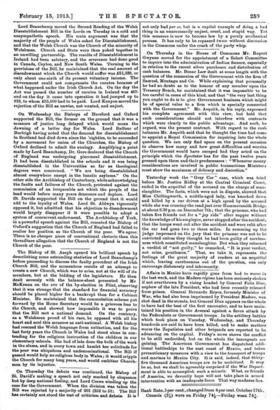On Wednesday the Bishops of Hereford and Oxford supported the
Bill, the former on the ground that it was a measure of justice long delayed which would mean the dawning of a better day for Wales. Lord Balfour of Burleigh having noted that the demand for disestablishment in Scotland had died down since the 'eighties, to be succeeded by a movement for union of the Churches, the Bishop of Oxford declined to admit the analogy. Amplifying a point made by Lord Beauchamp, Dr. Gore declared that the Church of England was undergoing piecemeal disestablishment. It had been disestablished in the schools and it was being disestablished in the Universities so far as theological degrees were concerned. " We are being disestablished almost everywhere except in the lunatic asylums." On the other side the Archbishop of Canterbury, while acknowledging the faults and failures of the Church, protested against the commission of an irreparable act which the people of the land would before many years denounce and deplore. Lord St. Davids supported the Bill on the ground that it would add to the loyalty of Wales. Lord St. Aldwyn vigorously opposed it, but admitted that his objection to disendowment would largely disappear if it were possible to adopt a system of concurrent endowment. The Archbishop of York, in a powerful speech against the Bill, resented the Bishop of Oxford's suggestion that the Church of England had failed to realize her position as the Church of the poor. We agree. There is no cheaper piece of conventional rhetoric than this threadbare allegation that the Church of England is not the Church of the poor.










































 Previous page
Previous page